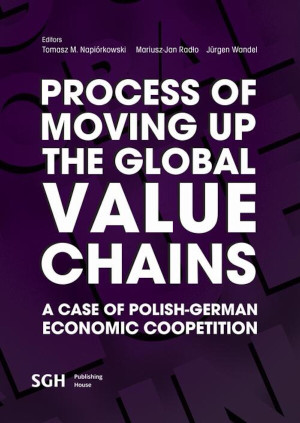
PROCESS OF MOVING UP THE GLOBAL VALUE CHAINS A CASE OF POLISH-GERMAN ECONOMIC COOPETITION
Producent: Szkoła Główna Handlowa
PROCESS OF MOVING UP THE GLOBAL VALUE CHAINS A CASE OF POLISH-GERMAN ECONOMIC COOPETITION PRACA ZBIOROWA This book presents the results of a research project aimed at answering the research question of how the Polish economy and its enterprises can advance within the global value chains. The answer to this question is to be given in the context of Polish-German economic relations, which are characterised by strong endogenous value chain links. The
relationships within the studied global value chains can be characterised as competition as well as cooperation and at times as a simultaneous combination of the two, i.e. coopetition.
There are three main reasons for taking up this topic. First, participation in the global value chains has been, is and â at least in the near future â will be of great importance for Polish enterprises and consequently for the Polish economy. This dependence, which ought to be seen in a positive context, is a result of the initial export-oriented economy development model adopted by Poland. This model makes use of Foreign Direct Investments as a source of technology transfers to domestic companies. Such transfers are used as inputs into the process of strengthening the potential of domestic companies for foreign expansion further strengthening the position of Polish firms in the global value chains. The second reason for this study is the advancement of enterprises in the global value chains, which is neither easy nor obvious. The countries that underwent such a process used various strategies to support this progress. These strategies include, but are surely not limited to subsidising innovation, periodic protection of the internal market, selective policy towards foreign investors and other industrial and commercial policy activities. As a member of the European Union, Poland can use only a few of a wide variety of instruments of such a policy, which results from the institutional conditions of the European Union internal market. The third reason for undertaking this research topic is the key importance of the Polish-German economic cooperation for the inclusion of the Polish economy in the global value chains. German companies are among the largest foreign investors in Poland, and the Polish-German trade, including that carried out within said value chains, is responsible for a large part of Polish foreign trade. The Polish-German cooperation in the discussed area includes not only cooperation, but also competition. Therefore, the Polish-German economic cooperation in the area, which is the subject of this study should be analysed from the theoretical perspective of the phenomenon of coopetition, which is already quite widely described in both the academic and business literature. It is also worth paying attention to the recent Polish- German-French political initiatives in relation to some instruments of industrial policy, including state aid and concentration control. This study consists of two parts divided into eight chapters. Part one is entitled âśTheoretical Aspects of Global Value Chainsâ and consists of three texts undertaking the topic of advancement in the global value chains. This part begins with Chapter 1 âśDevelopment of Global Value Chains as a Case of Growing Economic Coopetition. A Literature Reviewâ which examines the concept of global value chains and identifies the mechanisms of cooperation and competition within these structures. The Second Chapter âśMacro and Micro- Challenges in Moving up the Global Value Chains. The Polish Perspectiveâ presents the main challenges facing the Polish economy in the context of moving up the value chains. Moreover, due to the subject matter of the entire study, this text focuses especially on the value chain relations between Poland and Germany. The Third Chapter entitled âśHomogeneity of FDI-derived Technology Transfer Barriers across Transfer Channels. A Case Study Analysisâ undertakes the analysis of technology transfer channels from foreign to domestic enterprises in the context of the advancement of the latter in the global value chains. In the second part of this book, âśEmpirical Analysis of the Polish-German Case Studyâ, the authors present the results of empirical research on Polish-German economic coopetition and the question of how the Polish economy and enterprises can move up within the global value chains. This part begins with the Fourth Chapter entitled âśPolandâs Position in the Global Value Chainsâ, in which the author indicates that in recent years the role of Poland as a supplier and subcontractor for foreign enterprises has grown much more than as a recipient of value added used to manufacture products for export. The Fifth Chapter deals with the âśGerman-Polish Trade Relations from the Perspective of Trade in Value Added with Specific Focus on Trade in Digital Technologiesâ. Its author points out that trade in digital products is characterised by asymmetric growth in terms of added value and quantity, with a reference to imports, and the trade in the area of
Sklep: gandalf.com.pl
Cena:
28.29
22.91
Przejdź do sklepu